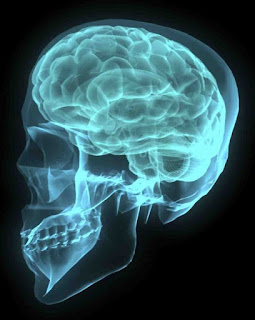The Human Brain is Amazing and Baffling
So many thing that have been studied, possibly even considered to have been fully understood, became disunderstood later on. Some models of the atom were proposed in seemingly rapid succession, Schrödinger's quantum model being the current favorite. Genetics was begun by Gregor Mendel (peas be upon him) and continues to be developed — and challenging to scientists. Both of these testify to the genius of the Creator. Something else that when scientists are understanding it, theories become frustrated is: The human brain.
In A. Conan Doyle's "The Blue Carbuncle," Sherlock Holmes stated the myth that people with larger skulls are more intelligent. People who are analytical use the left side of their brains more, and intuitive people use the right side. But that notion is disputed, and sometimes the brain rewires itself. There are people who live their lives not knowing that significant portions of their brains are missing!
 |
| X-ray-style image of skull and brain, Freeimages / Miranda Knox |
The human brain is an amazing organ, but its function has not always been well understood or appreciated. Ancient Egyptians believed it to be the equivalent of packing material, something like organic bubble wrap. . . . Aristotle thought that the brain provided a cooling mechanism for the blood, functioning as a radiator for the all-important heart. Other early physiologists claimed the brain was merely an outgrowth of the spinal cord, revealing similar underestimation of the many varied complex functions of the human brain.
To read the rest, head on over to "How Much Brain Do We Need to Be Human?"